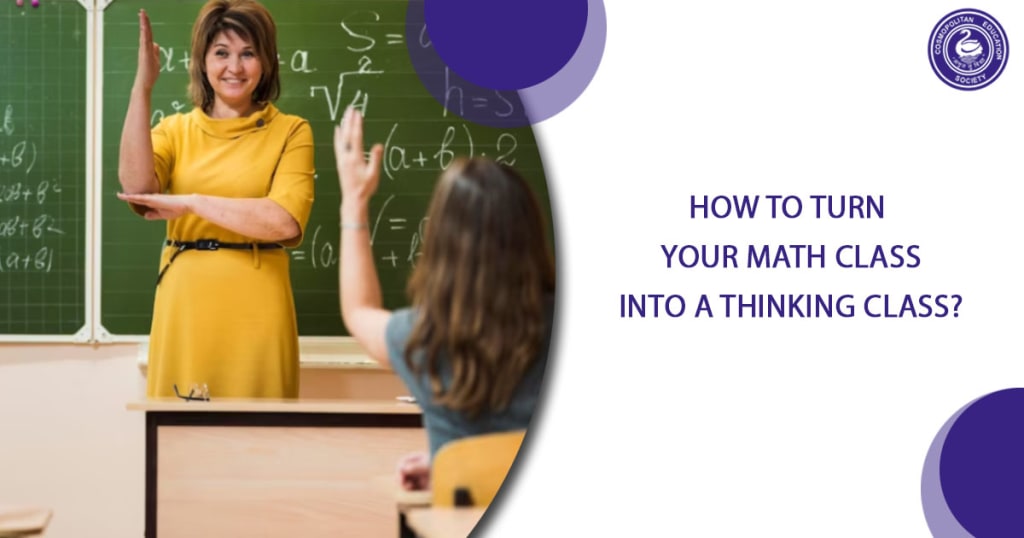How To Turn Your Math Class Into A Thinking Class?
Mathematics is often known to be a subject that solely requires memorization and rote learning.

Mathematics is often known to be a subject that solely requires memorization and rote learning. However, mathematics is much more than that. It is a subject that that requires not only critical thinking but also problem-solving and logical reasoning abilities. It is critical to turn a math class into a thinking class to boost students’ analytical abilities and help them excel in this interesting subject.
We will discuss ways to convert a boring math class into an interesting thinking class.
1. Focus on understanding, not just memorization:
Many students find math intimidating because they think they need to memorize a lot of formulas and procedures. Instead, teachers should focus on developing students’ conceptual understanding of the subject. For example, instead of just teaching the formula for finding the area of a triangle, teachers should explain why the rule works and how it is derived. This way, students will have a deeper understanding of the topic and be better equipped to solve mathematical problems.
2. Encourage problem-solving:
Problem-solving is an essential parameter of mathematics. Teachers should provide students with challenging problems that require them to think critically and creatively. The problems should be open-ended and should not have a single correct answer. This way, students will be encouraged to explore different solutions and develop their problem-solving skills. Teachers can also encourage students to work in groups to solve problems, which will promote collaboration and learning from your peers.
3. Use real-life examples:
Many students find math abstract and disconnected from their daily lives. To make math more attractive and important, teachers should use real-life examples in their teaching. For example, when teaching algebra, teachers can use examples from daily life, such as calculating the cost of groceries or planning a vacation budget. In these ways, students will see the practical applications of math and will be more motivated to learn.
4. Use technology:
Technology can be a powerful tool to enhance learning in math. Teachers can use interactive tools and software to teach math concepts. For example, they can use graphing calculators to teach graphing or spreadsheets to teach statistics. This way, students will be able to visualize and manipulate math concepts, which will deepen their understanding of the subject.
5. Encourage critical thinking:
Critical thinking is an essential skill for success in mathematics. Teachers should encourage students to question assumptions, analyze arguments, and evaluate evidence. For example, when teaching geometry, teachers can ask students to prove theorems using logical reasoning. This way, students will develop their analytical abilities and be better equipped in solving complex math problems.
6. Emphasize the process, not the answer:
In math, the process is just as important as the answer. Teachers should emphasize the importance of showing the steps and explaining the reasoning behind getting the right answers. Here, students will learn to think critically about the problem-solving process and will be better able to reason their answers.
Some quick tips to incorporate in your classroom to make a math session interesting.
Number talks: Numbers talks are sessions where students present various solutions to math problems. They do not come to the answer by penning it down or by using a calculator. Here, the emphasis is on getting to the answer through discussions and conversations that stay with the students longer.
Break down a math problem: Students solve problems by breaking and decomposing numbers. Take up a problem in bits and pieces for better problem-solving ability.
Summing up:
Turning math classes into thinking classes requires a shift in focus from rote learning to critical thinking and problem-solving. By emphasizing understanding, encouraging problem-solving, using real-life examples, using technology, encouraging critical thinking, and increasing the process, teachers can help students develop their analytical abilities and excel in math.
At Harshad Valia International School, we ensure our math classrooms are full of questions, conversations and logical reasoning.
Pure mathematics is, in its way, the poetry of logical ideas.
— Albert Einstein, German theoretical physicist
About the Creator
iDigitize Infotech LLP
We at iDigitize, elevate Brands with impactful digital marketing experiences & web development services. From developing your web presence to conveying your brand’s story, we align design & development with effective strategies






Comments
iDigitize Infotech LLP is not accepting comments at the moment
Want to show your support? Send them a one-off tip.